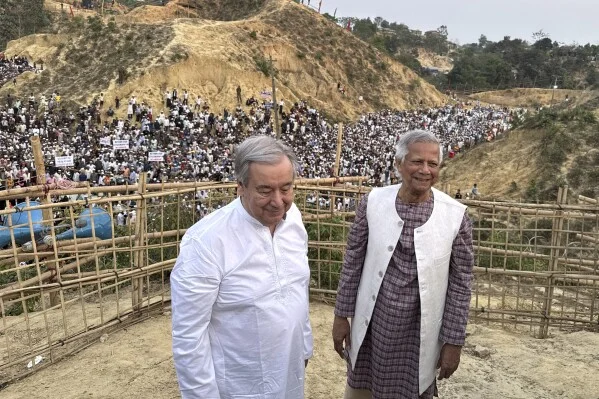Hope flickered amidst despair as UN Secretary-General Antonio Guterres recently visited the sprawling Rohingya refugee camps in Cox’s Bazar, Bangladesh. Home to nearly a million Rohingya displaced by brutal violence in Myanmar, these camps represent one of the world’s largest refugee settlements. But beneath the surface of international attention lies a growing crisis: dwindling aid and fading hope for a swift return home.
A Plea for Continued Support
Guterres’ visit aimed to spotlight the urgent needs of the Rohingya refugees and rally international support. He pledged that the United Nations would do everything possible to secure more funding, particularly in light of recent aid cuts from the US and other donor countries. These cuts threaten to exacerbate the already precarious living conditions within the camps, where access to food, clean water, and healthcare is often limited.
Bangladesh’s Commitment to Repatriation
Bangladesh’s interim government leader, Muhammad Yunus, reiterated his administration’s commitment to working with the UN to facilitate the repatriation of Rohingya refugees by next year. This promise offers a glimmer of hope for many refugees who yearn to return to their homeland. However, the complexities of the situation in Myanmar and ongoing safety concerns remain significant obstacles.
Breaking Fast, Sharing Hope
In a symbolic gesture of solidarity, Guterres and Yunus joined over 100,000 Rohingya refugees in breaking the Ramadan fast. This act of shared humanity underscored the urgency of finding a lasting solution to the Rohingya crisis. While the refugees expressed their desire to return to Myanmar, they also emphasized the crucial need for peace and security in their homeland, along with guarantees of their rights and an end to discrimination and persecution.
Funding Cuts: A Looming Disaster
Aid agencies are increasingly concerned about the impact of reduced funding. The potential consequences are dire, particularly regarding food and nutrition. Without adequate food rations, providing other essential services becomes nearly impossible. This could lead to increased instability and unrest within the camps, further jeopardizing the well-being of the refugees.
Youth Concerns and Future Stability
Despite the promises and pledges, some young Rohingya refugees remain skeptical. They expressed concerns that hunger and deprivation could breed discontent and threaten the fragile peace within the camps. “People cannot be happy without proper food,” one young refugee stated poignantly, highlighting the fundamental importance of basic necessities.
A Call for International Mediation
Nearly eight years after the conflict began, the situation remains unresolved. Community leaders now believe that a peaceful resolution in Myanmar is unattainable without strong international mediation. The international community must step up its efforts to facilitate dialogue and ensure the safety and dignity of the Rohingya people, both in the refugee camps and upon their eventual return to Myanmar.
Looking Ahead
The future of the Rohingya refugees hangs in the balance. While the UN’s commitment and Bangladesh’s efforts are vital, sustained international support is crucial to avert a humanitarian crisis. Addressing the root causes of the conflict in Myanmar and ensuring the safe and voluntary return of the Rohingya people remain the ultimate goals. The world must not turn a blind eye to their plight.

I’m a passionate writer and digital storyteller with a keen interest in technology, current affairs, and creative expression. Whether I’m researching the latest trends or sharing my thoughts on everyday topics, I aim to connect with people through honest and engaging content. When I’m not busy writing, you’ll likely find me exploring new ideas, reading widely, or enjoying the great outdoors. Thanks for visiting my profile—let’s share some great stories together!





